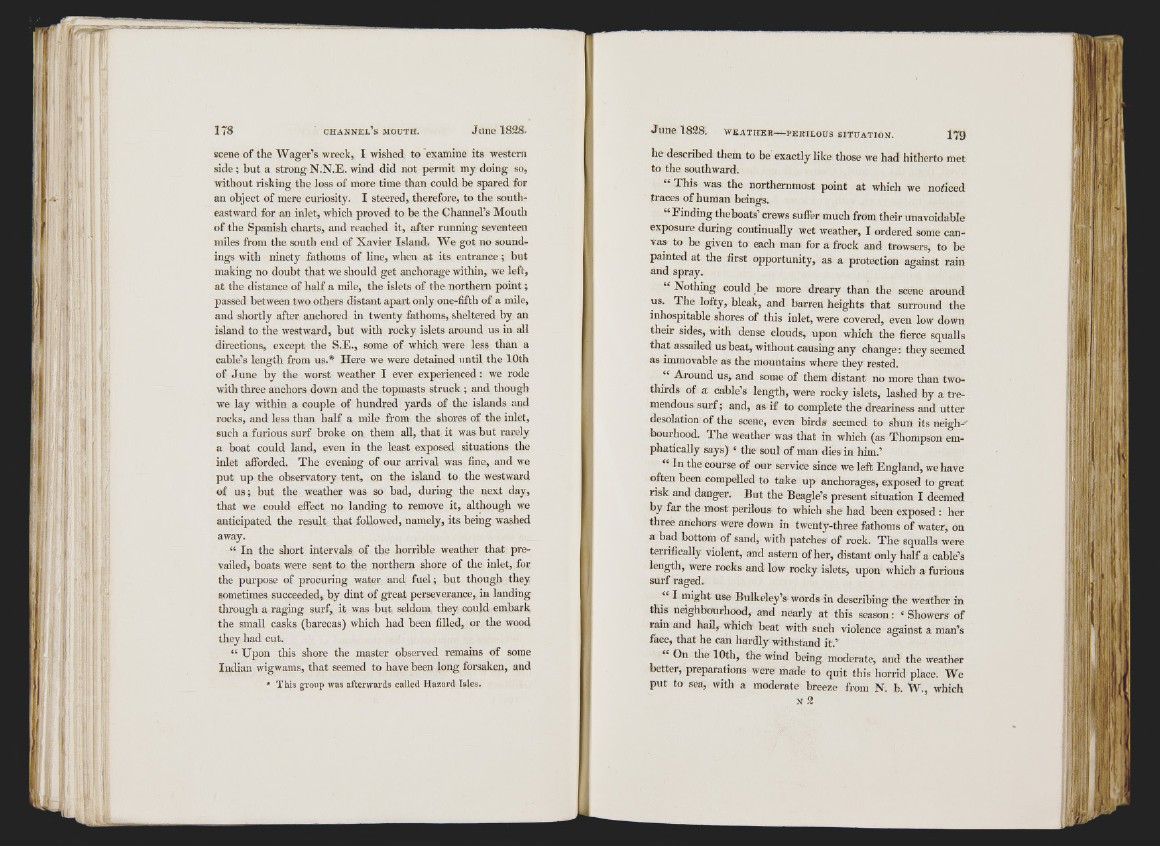
I 1
1 i.:
178
scene of the Wager’s wreck, I wished to examine its western
side; but a strong N.N.E. wind did not permit my doing so,
without risking the loss of more time than could be spared for
an object of mere curiosity. I steered, therefore, to the southeastward
for an inlet, which proved to be the Channel’s Mouth
of the Spanish charts, and reached it, after running seventeen
miles from the south end of Xavier Island. We got no soundings
with ninety fathoms of line, when at its entrance ; but
making no doubt that we should get anchorage within, we left,
at the distance of half a mile, the islets of the northern point;
passed between two others distant apart only one-fifth of a mile,
and shortly after anchored in twenty fathoms, sheltered by an
island to the westward, but with rocky islets around us in all
directions, except the S.E., some of which were less than a
cable’s length from us.* Here we were detained until the 10th
of June by the worst weather I ever experienced : we rode
with three anchors down and the topmasts struck ; and though
we lay within a couple of hundred yards of the islands and
rocks, and less than half a mile from the shores of the inlet,
such a furious surf broke on them all, that it was but rarely
a boat could land, even in the least exposed situations the
inlet afforded. The evening of our arrival was fine, and we
put up the observatory tent, on the island to the westward
of us; but the weather was so bad, during the next day,
that we could effect no landing to remove it, although we
anticipated the result that followed, namely, its being washed
away.
“ In the short intervals of the horrible weather that prevailed,
boats were sent to the northern shore of the inlet, for
the pui-pose of procuring water and fuel; but though they
sometimes succeeded, by dint of great perseverance, in landing
through a raging surf, it was but seldom they could embark
the small casks (barecas) which had been filled, or the wood
they had cut.
“ Upon this shore the master observed remains of some
Indian wigwams, that seemed to have been long forsaken, and
• This group was afterwards called Hazard Isles.
he described them to be exactly like those we had hitherto met
to the southward.
“ This was the northernmost point at which we noticed
traces of human beings.
Finding the boats’ crews suffer much from their unavoidable
exposure during continually wet weather, I ordered some canvas
to be given to each man for a frock and trowsers, to be
painted at the first opportunity, as a protection against rain
and spray.
“ Nothing could be more dreary than the scene around
us. The lofty, bleak, and barren heights that surround the
inhospitable shores of this inlet, were covered, even low down
their sidra, with dense clouds, upon which the fierce squaUs
that assailed us beat, without causing any change: they seemed
as immovable as the mountains where they rested.
“ Around us, and some of them distant no more than two-
thirds of a cable’s length, were rocky islets, lashed by a tremendous
surf; and, as if to complete the dreariness and utter
desolation of the scene, even birds seemed to shun its neighbourhood.
The weather was that in which (as Thompson emphatically
says) ‘ the soul of man dies in him.’
“ In the course of our service since we left England, we have
often been compelled to take up anchorages, exposed to great
risk and danger. But the Beagle’s present situation I deemed
by far the most perilous to which she had been exposed: her
three anchors were down in twenty-three fathoms of water, on
a bad bottom of sand, with patches of rock. The squalls were
terrifically violent, and astern of her, distant only half a cable’s
length, were rocks and low rocky islets, upon which a furious
surf raged.
“ I might use Bulkeley’s words in describing the weather in
this neighbourhood, and nearly at this season: ‘ Showers of
ram and hail, which beat with such violence against a man’s
face, that he can hardly withstand it.’
“ On the 10th, the wind being moderate, and the weather
better, preparations were made to quit this horrid place. We
put to sea, with a moderate breeze from N. b. W., which
N 2
i. i!h
<